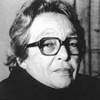Of all of Nicolas Rey's films (and he has made more than three, after all), Les soviets plus l'électricité is undoubtly the most perfect, most accomplished, showing more of him (as a traveller and a filmmaker) and constructed more personal than ever before. In the first place, Nicolas was responsible for everything. He processed the old Super-8 stock and blew it up to 16mm himself, adding the sound he recorded along the way on a dictaphone in his small lab. The final product is a three-stage, three-hour cinematic journey on the trail of condemned prisoners dragged to the furthest ends of Siberia. It begins with Vysotky's famous song, "Magadan". Nicolas not only realises his dream and undertakes this impossible, unimaginable journey. He also captures it cinematically as images and sounds, movement, light, colour, black leaders and intertitles. (...)
During that journey, he reveals a few important elements of his own life (his father built power plants, his grandfather was a communist) and whispers premonitory warnings about a Russia that now embraces capitalism and consumerism. The use of slow-motion, the ever-fewer images (at first there are nine per second, at the end only one) and the crackly soundtrack gradually create a kind of pleasant, happily marching singsong that carries the viewer "on a trip" as if watching an alien vision from another planet. It is the journey of an voluntary prisoner at the end of the 20th century. At the same time, all the flaws in the emulsion (stains, decomposition, and the almost choreographically detached medium) become a quality in themselves. You see the beauty of works by Turner or Monet. The film is a two-dimensional, animated and mobile painting. There is a wonderful scene in which a lorry-driver finally manages to take his vehicle off the side of the mud, reminiscent of the scene in Le Salaire de la Peur (Wages of Fear) featuring a lorry in a bog. If you film in the right place at the right time, the outcome is great cinema, it's as simple as that. The humour, poetry, and most importantly, inimitable sound of Nicolas' voice - half casual, half relaxed and half fearful (three halves) - make this journey "beyond time" a late companion to those of Kerouac, Lowry and Ginsburg.
Although the film gives itself life during its creation and reinvents itself at every screening, it also appears to harbour the seeds of its own death or destruction. This is an unusual and yet completely plausible blend of real fragility. Nicolas, the survivor of this heroic, bold and crazy adventure (and it is crazier than you first think), is seldom seen. Towards the end, he films himself stiffly turning in circles with outstretched arms like a man lost and found, as if trying to prove himself that he still exists, that the film can still capture and take its hero prisoner, as a shadow of himself.
Boris Lehman
Back to soviets
